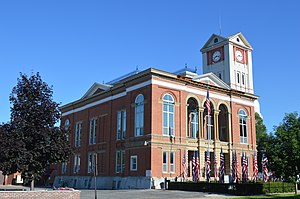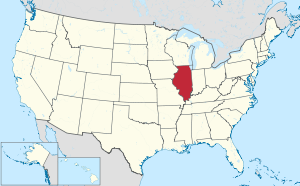Schuyler County, Illinois
Schuyler County | |
|---|---|
 Schuyler County Courthouse, Rushville | |
 Location within the U.S. state of Illinois | |
 Illinois's location within the U.S. | |
| Coordinates: 40°10′N 90°37′W / 40.16°N 90.61°W | |
| Country | |
| State | |
| Founded | 1825 |
| Named for | Philip Schuyler |
| Seat | Rushville |
| Largest city | Rushville |
| Area | |
| • Total | 441 sq mi (1,140 km2) |
| • Land | 437 sq mi (1,130 km2) |
| • Water | 4.1 sq mi (11 km2) 0.9% |
| Population (2020) | |
| • Total | 6,902 |
| • Density | 16/sq mi (6.0/km2) |
| Time zone | UTC−6 (Central) |
| • Summer (DST) | UTC−5 (CDT) |
| Congressional district | 15th |
| Website | www |
Schuyler County is a county in the U.S. state of Illinois. According to the 2020 census, it had a population of 6,902.[1] Its county seat is Rushville.[2]
History
Schuyler County was formed in 1825 out of Pike and Fulton counties. It is named for Philip Schuyler, member of the Continental Congress and Senator from New York. In 1826, the county seat was moved from Beardstown (now in Cass County) to Rushville.[3]
-
Schuyler County (1825), with unorganized territory, Warren County, and Mercer County assigned to it.[4]
-
Schuyler County (1826–1830), with McDonough County assigned to it.
-
Schuyler (1830–1839), with McDonough County becoming organized.
-
Schuyler in 1839, when the creation of Brown County reduced Schuyler to its present borders.
Geography
According to the US Census Bureau, the county has a total area of 441 square miles (1,140 km2), of which 437 square miles (1,130 km2) is land and 4.1 square miles (11 km2) (0.9%) is water.[5]
Climate and weather
| Rushville, Illinois | ||||||||||||||||||||||||||||||||||||||||||||||||||||||||||||
|---|---|---|---|---|---|---|---|---|---|---|---|---|---|---|---|---|---|---|---|---|---|---|---|---|---|---|---|---|---|---|---|---|---|---|---|---|---|---|---|---|---|---|---|---|---|---|---|---|---|---|---|---|---|---|---|---|---|---|---|---|
| Climate chart (explanation) | ||||||||||||||||||||||||||||||||||||||||||||||||||||||||||||
| ||||||||||||||||||||||||||||||||||||||||||||||||||||||||||||
| ||||||||||||||||||||||||||||||||||||||||||||||||||||||||||||
In recent years, average temperatures in the county seat of Rushville have ranged from a low of 15 °F (−9 °C) in January to a high of 87 °F (31 °C) in July, although a record low of −26 °F (−32 °C) was recorded in February 1905 and a record high of 113 °F (45 °C) was recorded in July 1936. Average monthly precipitation ranged from 1.55 inches (39 mm) in January to 5.14 inches (131 mm) in May.[6]
Major highways
Adjacent counties
- Hancock County (northwest)
- McDonough County (north)
- Fulton County (northeast)
- Mason County (east)
- Cass County (southeast)
- Brown County (south)
- Adams County (southwest)
Demographics
| Census | Pop. | Note | %± |
|---|---|---|---|
| 1840 | 6,972 | — | |
| 1850 | 10,573 | 51.6% | |
| 1860 | 14,684 | 38.9% | |
| 1870 | 17,419 | 18.6% | |
| 1880 | 16,249 | −6.7% | |
| 1890 | 16,013 | −1.5% | |
| 1900 | 16,129 | 0.7% | |
| 1910 | 14,852 | −7.9% | |
| 1920 | 13,285 | −10.6% | |
| 1930 | 11,676 | −12.1% | |
| 1940 | 11,430 | −2.1% | |
| 1950 | 9,613 | −15.9% | |
| 1960 | 8,746 | −9.0% | |
| 1970 | 8,135 | −7.0% | |
| 1980 | 8,365 | 2.8% | |
| 1990 | 7,498 | −10.4% | |
| 2000 | 7,189 | −4.1% | |
| 2010 | 7,544 | 4.9% | |
| 2020 | 6,902 | −8.5% | |
| 2023 (est.) | 6,733 | [7] | −2.4% |
| US Decennial Census[8] 1790-1960[9] 1900-1990[10] 1990-2000[11] 2010[12] | |||
As of the 2010 United States Census, there were 7,544 people, 3,040 households, and 2,014 families residing in the county.[13] The population density was 17.3 inhabitants per square mile (6.7/km2). There were 3,459 housing units at an average density of 7.9 per square mile (3.1/km2).[5] The racial makeup of the county was 95.5% white, 3.2% black or African American, 0.2% American Indian, 0.1% Asian, 0.5% from other races, and 0.5% from two or more races. Those of Hispanic or Latino origin made up 1.2% of the population.[13] In terms of ancestry, 26.8% were American, 20.2% were German, 13.1% were English, and 12.0% were Irish.[14]
Of the 3,040 households, 28.2% had children under the age of 18 living with them, 53.5% were married couples living together, 7.6% had a female householder with no husband present, 33.8% were non-families, and 28.6% of all households were made up of individuals. The average household size was 2.33 and the average family size was 2.83. The median age was 43.6 years.[13]
The median income for a household in the county was $43,686 and the median income for a family was $51,654. Males had a median income of $40,998 versus $28,810 for females. The per capita income for the county was $20,649. About 8.6% of families and 14.0% of the population were below the poverty line, including 16.8% of those under age 18 and 14.1% of those age 65 or over.[15]
Government and politics
In 1853, Schyler County adopted the township form of county government.[3] Since November 22, 2013, Schuyler County is located in Regional Office of Education #26 alongside Hancock, Fulton, and McDonough counties.[16]
The county is located in Illinois's 15th Congressional District and is currently represented by Republican Mary Miller. In the Illinois General Assembly, the county is split between multiple legislative districts. The northern portion of the county is located in the 47th legislative district and the 94th house district represented by Senator Neil Anderson and Representative Norine Hammond respectively. The southern portion of the county is located in the 50th legislative district and the 99th house district represented by Senator Jil Tracy and Representative Randy Frese respectively.[17]
In presidential elections, Schuyler County usually favors Republican candidates, having voted for Democratic presidential candidates in only four elections during the period of 1944–2020. Since 1944, the Democratic candidate has won a majority of the vote in Schuyler County only once (in 1964).
| Year | Republican | Democratic | Third party | |||
|---|---|---|---|---|---|---|
| No. | % | No. | % | No. | % | |
| 2020 | 2,773 | 70.78% | 1,068 | 27.26% | 77 | 1.97% |
| 2016 | 2,524 | 65.83% | 1,075 | 28.04% | 235 | 6.13% |
| 2012 | 2,069 | 53.02% | 1,727 | 44.26% | 106 | 2.72% |
| 2008 | 1,833 | 47.75% | 1,900 | 49.49% | 106 | 2.76% |
| 2004 | 2,403 | 59.61% | 1,594 | 39.54% | 34 | 0.84% |
| 2000 | 2,077 | 55.06% | 1,587 | 42.07% | 108 | 2.86% |
| 1996 | 1,597 | 42.60% | 1,636 | 43.64% | 516 | 13.76% |
| 1992 | 1,512 | 37.85% | 1,650 | 41.30% | 833 | 20.85% |
| 1988 | 2,178 | 53.57% | 1,866 | 45.89% | 22 | 0.54% |
| 1984 | 2,515 | 61.93% | 1,533 | 37.75% | 13 | 0.32% |
| 1980 | 2,799 | 62.76% | 1,445 | 32.40% | 216 | 4.84% |
| 1976 | 2,635 | 56.44% | 2,014 | 43.14% | 20 | 0.43% |
| 1972 | 2,994 | 66.03% | 1,534 | 33.83% | 6 | 0.13% |
| 1968 | 2,760 | 60.00% | 1,475 | 32.07% | 365 | 7.93% |
| 1964 | 2,417 | 49.12% | 2,504 | 50.88% | 0 | 0.00% |
| 1960 | 3,047 | 59.00% | 2,115 | 40.96% | 2 | 0.04% |
| 1956 | 3,068 | 58.22% | 2,189 | 41.54% | 13 | 0.25% |
| 1952 | 3,295 | 61.30% | 2,076 | 38.62% | 4 | 0.07% |
| 1948 | 2,519 | 49.65% | 2,464 | 48.56% | 91 | 1.79% |
| 1944 | 2,801 | 51.82% | 2,555 | 47.27% | 49 | 0.91% |
| 1940 | 3,318 | 48.77% | 3,404 | 50.04% | 81 | 1.19% |
| 1936 | 3,029 | 43.54% | 3,885 | 55.84% | 43 | 0.62% |
| 1932 | 2,075 | 34.99% | 3,782 | 63.78% | 73 | 1.23% |
| 1928 | 3,011 | 54.00% | 2,542 | 45.59% | 23 | 0.41% |
| 1924 | 2,729 | 46.21% | 2,860 | 48.43% | 317 | 5.37% |
| 1920 | 2,800 | 53.86% | 2,258 | 43.43% | 141 | 2.71% |
| 1916 | 2,595 | 41.57% | 3,392 | 54.34% | 255 | 4.09% |
| 1912 | 694 | 20.25% | 1,714 | 50.00% | 1,020 | 29.75% |
| 1908 | 1,622 | 43.31% | 1,876 | 50.09% | 247 | 6.60% |
| 1904 | 1,636 | 45.28% | 1,682 | 46.55% | 295 | 8.16% |
| 1900 | 1,791 | 44.22% | 2,167 | 53.51% | 92 | 2.27% |
| 1896 | 1,848 | 43.37% | 2,334 | 54.78% | 79 | 1.85% |
| 1892 | 1,563 | 41.20% | 1,880 | 49.55% | 351 | 9.25% |
Communities
City
- Rushville (seat)
Villages
Unincorporated communities
Townships
See also
References
- ^ "Schuyler County, Illinois". United States Census Bureau. Retrieved June 10, 2023.
- ^ "Find a County". National Association of Counties. Retrieved June 7, 2011.
- ^ a b White, Jesse (ed.). "Schuyler County". Illinois Regional Archives Depository System. Illinois Secretary of State. Archived from the original on May 15, 2021. Retrieved December 27, 2023.
- ^ White, Jesse. Origin and Evolution of Illinois Counties. State of Illinois, March 2010. [1]
- ^ a b "Population, Housing Units, Area, and Density: 2010 - County". US Census Bureau. Archived from the original on February 12, 2020. Retrieved July 12, 2015.
- ^ a b "Monthly Averages for Rushville IL". The Weather Channel. Retrieved January 27, 2011.
- ^ "Annual Estimates of the Resident Population for Counties: April 1, 2020 to July 1, 2023". United States Census Bureau. Retrieved April 2, 2024.
- ^ "US Decennial Census". US Census Bureau. Retrieved July 8, 2014.
- ^ "Historical Census Browser". University of Virginia Library. Retrieved July 8, 2014.
- ^ "Population of Counties by Decennial Census: 1900 to 1990". US Census Bureau. Retrieved July 8, 2014.
- ^ "Census 2000 PHC-T-4. Ranking Tables for Counties: 1990 and 2000" (PDF). US Census Bureau. Retrieved July 8, 2014.
- ^ "State & County QuickFacts". US Census Bureau. Archived from the original on June 7, 2011. Retrieved July 8, 2014.
- ^ a b c "Profile of General Population and Housing Characteristics: 2010 Demographic Profile Data". US Census Bureau. Archived from the original on February 13, 2020. Retrieved July 12, 2015.
- ^ "Selected Social Characteristics in the United States – 2006-2010 American Community Survey 5-Year Estimates". US Census Bureau. Archived from the original on February 13, 2020. Retrieved July 12, 2015.
- ^ "Selected Economic Characteristics – 2006-2010 American Community Survey 5-Year Estimates". US Census Bureau. Archived from the original on February 13, 2020. Retrieved July 12, 2015.
- ^ Chico, Gery J. (November 23, 2013). "Order of the State Board of Education Pursuant to 105 ILCS 5/3A-4 (a)" (PDF). Illinois State Board of Education. Archived from the original (PDF) on January 6, 2018. Retrieved April 24, 2022.
- ^ "Maps of Districts of the Illinois House of Representatives (2023-2033)". Illinois State Board of Elections. July 16, 2022. Retrieved November 14, 2022.
- ^ Leip, David. "Atlas of US Presidential Elections". uselectionatlas.org. Retrieved November 12, 2018.

![Schuyler County (1825), with unorganized territory, Warren County, and Mercer County assigned to it.[4]](http://upload.wikimedia.org/wikipedia/commons/thumb/d/d9/Schuyler_County_Illinois_1825.png/85px-Schuyler_County_Illinois_1825.png)



